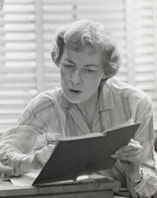 Martha Baird (1921—1981), poet, editor, author and musicologist, was born in Dodge City, Kansas. A graduate of the State University of Iowa, she worked as a script writer at WGN radio in Chicago and later, after moving to New York in 1943, worked for the American Guild of Variety Artists (AGVA). She began her study of Aesthetic Realism with its founder, Eli Siegel, that same year. She writes about her early study in her book Two Aesthetic Realism Papers (Definition Press, 1971). She was secretary of the Society for Aesthetic Realism. Martha Baird and Eli Siegel married in 1944.
Martha Baird (1921—1981), poet, editor, author and musicologist, was born in Dodge City, Kansas. A graduate of the State University of Iowa, she worked as a script writer at WGN radio in Chicago and later, after moving to New York in 1943, worked for the American Guild of Variety Artists (AGVA). She began her study of Aesthetic Realism with its founder, Eli Siegel, that same year. She writes about her early study in her book Two Aesthetic Realism Papers (Definition Press, 1971). She was secretary of the Society for Aesthetic Realism. Martha Baird and Eli Siegel married in 1944.
Her book of poems, Nice Deity, was published in 1955 by Definition Press. Commenting on it, Evelyn Scott, noted author of The Wave and A Calendar of Sin, wrote in part, “Martha Baird proves herself, in her poetry, a genuine personality in art, sensitive and unique.” Her poetry also appears in Personal and Impersonal: Six Aesthetic Realists (Terrain Gallery, 1959) and is anthologized in journals, books and textbooks, including Poetry for Pleasure (Doubleday, 1960), the Pageant of Literature series (Macmillan, 1965), Macmillan’s Reading Program series (1965), and the New Basic Readers series (Scott, Foresman, 1970). Her 1966 poem “We Are Responsible, or: Napalm” was published by the Terrain Gallery as a broadside, reprinted in SANE newsletters, and was translated into German for the book Vietnam in Dieser Stunde (Halle, 1968).
Martha Baird’s prose work includes the radio plays The Inside and Outside of Winnington Snail and The Comma That Didn’t Belong Anywhere, which has been adapted for the screen as Thomas Comma, an animated film by Emmy award-winning filmmaker Ken Kimmelman (Imagery Films, 2009).
Her work as editor includes the following books: James and the Children: A Consideration of Henry James’s “The Turn of the Screw,” by Eli Siegel (Definition Press, 1968); (with Ellen Reiss) The Williams-Siegel Documentary (Definition Press, 1970); and Goodbye Profit System, by Eli Siegel (Definition Press, 1970), which she later adapted, with Tom Shields, as three-act musical play.
Martha Baird wrote of herself, “I am passionately interested in Aesthetic Realism as a critical method for understanding why something in art is good or not, particularly literature and music.” Her article The Problems of Music Are Like Those of Myself, appeared in the March 1971 issue of Allegro, journal of the American Federation of Musicians, Local 802. She is composer of The Bilge Concerto, an electronic music-drama. Her critical writings on a wide range of musical genres, which have been presented to the public in dramatic readings at the Aesthetic Realism Foundation, are loved for the way they mingle scholarship, vivacity and warmth. They include: Opposites in Mozart: Con Amore; Greatness in Music: The Marseillaise; Marilyn Horne and Ethel Merman: Assertive and Yielding; Opposites in Aida: That Grand Opera; The Conductor’s Art; The History of the Orchestra: Monteverdi, Bach, Wagner. Her lecture series Music Is Real is studied in the Aesthetic Realism Foundation course The Opposites in Music.

